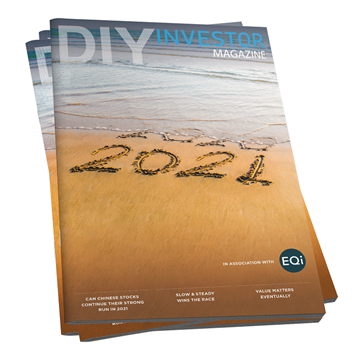Can Chinese stocks continue their strong run in 2021?




The swift revival in China’s economic activity creates a fertile backdrop for its corporate sector. Dale Nicholls, portfolio manager of Fidelity China Special Situations PLC, examines the investment opportunities ahead and explains how he is focusing on the structural trends accelerated by Covid-19.
Are you optimistic about the year ahead?
Definitely. Decisive action on the Covid-19 virus has supported economic recovery in China. Small localised outbreaks have been dealt with deftly and without denting economic momentum. This is reflected in forward-looking economic statistics (such as Purchasing Managers’ Indices), which have recovered well ahead of other Asian and Western peers. 1
Good performance from the services and exports sectors buoyed economic growth in the June to September period, with GDP rising 4.9%. The fourth quarter GDP figure of 6.5% exceeded expectations as key laggards in the service sector – travel and leisure – are gaining momentum.
Government stimulus has helped, but overall has been more restrained and targeted than measures seen in most Western economies. This gives the Chinese government some remaining firepower if the Covid crisis reignites.
Chinese markets have ticked higher as investors have recognised the country’s stronger economic performance. Nevertheless, share prices continue to be at a significant discount to the US markets, despite arguably better growth prospects.
The return to “normality” in China should mean lower risks relative to those countries still struggling to get the virus under control. We still see many companies left behind by markets offering significant value.
Which risks are you monitoring most closely?
Geopolitics and capital market reform are two areas to monitor. Throughout the year we have continued to see tensions rise between the US and China. These tensions are entrenched, but a more measured approach from the US side is likely under the new administration.
While the portfolio is largely focused on opportunities supported by ongoing structural shifts in China’s domestic economy, this is a useful backdrop.
Capital market reforms in China include the loosening of short-selling restrictions, the lowering of foreign investment restrictions and the implementation of a registration-based IPO mechanism.
The registration-based IPO mechanism was launched last July on the STAR Board (the science and technology innovation board of the Shanghai Stock Exchange) and is now being employed on ChiNext. In these markets, listing criteria are also more flexible, and we believe this will encourage more tech and new economy companies to list on the A-share market.
Looking ahead, we believe further expansion of these reforms to the broader A-share markets would be positive for Chinese markets. We have already seen more IPOs of A-shares and Red Chip companies this year and there could be more to come given more flexible listing requirements and some interest from US companies
That said, as always, we do need to follow regulatory developments closely. Recently we have seen draft regulation in the fintech space that delayed the hotly-anticipated Ant IPO, plus there are some anti-trust rules brewing in the technology area. We don’t sense that these will change the outlook significantly for the large technology companies, but developments certainly need to be monitored.
What themes, sectors or regions stand out as offering opportunities in a post Covid-19 world?
Our focus is firmly on ‘New’ China. That means steering the portfolio towards sectors that will grow their share of the economy over time, particularly among the consumer-related, technology and healthcare sector. In many of these areas, Covid-19 has super-charged structural trends already underway in China.
E-commerce is a particularly compelling theme. Many consumer goods in China have real capacity for growth and we see a trend towards upgrading and buying premium brands.
Within financials, we are particularly interested in insurance. ‘Protection’ type life insurance is only lightly used and we believe demand will naturally rise with higher incomes. Covid-19 could accelerate demand as people look at ways to protect themselves and their families from future crises. This would benefit areas such as health insurance.
Sustainability is becoming increasingly important for investors. Is it possible to invest sustainably in China? And how is this reflected in your portfolio?
Chinese companies are improving their sustainability footprint all the time. Sustainable investing remains a core part of our investment process and we believe that high standards of corporate responsibility make good business sense. It helps manage risks and it has the potential to enhance returns We integrate Environmental, Social and Governance (ESG) issues into our research and investment decision-making process.
We favour engaging with companies to improve their behaviour, rather than excluding companies from the portfolio. This can bring long-term changes, adding value for companies, our investors and society. Our recent ESG engagements have included areas such as supply chain sustainability and how companies can improve their reporting on sustainability issues.
Based on our internal ESG ratings, around three-quarters of the portfolio is currently invested in companies that rate highly from a sustainability perspective. While most of the remainder are not rated, this portion has been falling as our ESG research coverage expands.
Within your portfolio, where do you have strongest conviction and, in contrast, which areas are you avoiding?
We judge the underlying value of companies through an assessment of their growth prospects, underlying competitive strengths and the quality of management teams. We tend to find companies that meet our criteria more often among smaller companies. As long as these companies can execute well and deliver on their promises, growing earnings over time, this should ultimately be reflected in stronger share prices over time.
As well as those companies geared to China’s long-term structural growth story we mention above, we are also finding opportunities is in the materials space in China. This incorporates several sectors that are still fragmented, but where signs of consolidation are underway. We are focused on the leaders emerging from this process. Examples would be in areas such as paint and floor tiles.
More generally, given the strong run in markets - notably in technology, healthcare and staples sectors - value is becoming harder to find, but there are still overlooked opportunities, especially among small-cap companies. For example, many healthy, fast-growing Hong Kong-listed small-caps still at single-digit PE ratios. We see real opportunities ahead as China emerges from this crisis.
Source: Bloomberg News as at 30.11.2020
Source: Fortune.com as at 19.10.20
To buy this trust login to your EQi account
Select Fidelity China Special Situations PLC - GB00B62Z3C74
Important information
The value of investments and the income from them can go down as well as up, so you may get back less than you invest. Past performance is not a reliable indicator of future returns. Investors should note that the views expressed may no longer be current and may have already been acted upon. Reference to specific securities should not be construed as a recommendation to buy or sell these securities and is included for the purposes of illustration only. This information is not a personal recommendation for any particular investment. If you are unsure about the suitability of an investment you should speak to an authorised financial adviser.
Overseas investments will be affected by movements in currency exchange rates. The Fidelity China Special Situations Investment Trust invests in emerging markets which can be more volatile than other more developed markets. This trust invests more heavily than others in smaller companies, which can carry a higher risk because their share prices may be more volatile than those of larger companies and the securities are often less liquid. This trust uses financial derivative instruments for investment purposes, which may expose it to a higher degree of risk and can cause investments to experience larger than average price fluctuations.
The shares in the investment trust are listed on the London Stock Exchange and their price is affected by supply and demand. The investment trust can gain additional exposure to the market, known as gearing, potentially increasing volatility.
The latest annual reports, key information documents (KID) and factsheets can be obtained from our website at www.fidelity.co.uk/its or by calling 0800 41 41 10. The full prospectus may also be obtained from Fidelity. Fidelity Investment Trusts are managed by FIL Investments International. Issued by Financial Administration Services Limited, authorised and regulated by the Financial Conduct Authority. Fidelity, Fidelity International, the Fidelity International logo and F symbol are trademarks of FIL Limited. UKM0221/33151/SSO/0521
Read the latest edition of DIY Investor Magazine
DIY Investor Magazine
The views and opinions expressed by the author, DIY Investor Magazine or associated third parties may not necessarily represent views expressed or reflected by EQi.
The content in DIY Investor Magazine is non-partisan and we receive no commissions or incentives from anything featured in the magazine.
The value of investments can fall as well as rise and any income from them is not guaranteed and you may get back less than you invested. Past performance is not a guide to future performance.
DIY Investor Magazine delivers education and information, it does not offer advice. Copyright© DIY Investor (2016) Ltd, Registered in England and Wales. No. 9978366 Registered office: Mill Barn, Mill Lane, Chiddingstone, Kent TN8 7AA.
